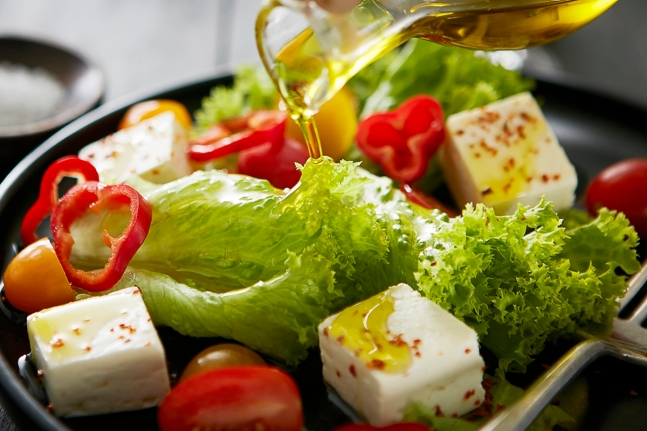
No matter how much salad I eat, I don't lose weight... The problem is adding 'this'
2024.08.06 20:30
Views Likes Scraps
The dressing itself is not good... hmm...
Eating a salad with only balsamic vinegar, or
Making your own dressing... It's really hard to eat healthily, haha.
I'm glad that I don't really dislike mayonnaise-based dressings much haha.
-----------------------------------

Salads have relatively lower calories and higher satiety compared to other foods, so they are often eaten as a diet menu. However, some salads can be high in calories, and consuming them unconsciously may hinder your diet.
Dressings served with salads are major contributors to increased calorie intake. Especially when salad dressing is poured over the salad, it results in higher calorie consumption compared to dipping the salad in sauce separately. Notably, mayonnaise-based dressings like Caesar and Thousand Island contain approximately 370 kcal and 400 kcal per 100 grams, respectively. Depending on the amount of salad, if about 50 grams of dressing is used on a plate, it already exceeds the calorie content of a bowl of rice, which is about 300 kcal. Moreover, mayonnaise contains a high amount of sodium. Thousand Island dressing has a sodium content of 863 grams per 100 grams. Low-fat dressings are not necessarily safe either, as they may contain added sugars or other additives to compensate for reduced fat.
To see the effects of dieting, it is good to consume vinegar-based dressings. Balsamic vinegar is made from fermented grape juice and has a relatively low calorie content of 88.2 kcal per 100g. Additionally, the citric acid that gives it a tangy flavor helps break down fats, making it effective for weight loss. Moreover, making low-calorie diet dressings at home, such as tofu and nut dressings or pumpkin yogurt dressings, can also be helpful.
Adding eggs to salads helps the absorption of carotenoids, antioxidants found in vegetables, by aiding the absorption of the yolk’s fats. In fact, a study published in the American Journal of Clinical Nutrition found that people who ate salads with eggs had higher carotenoid absorption rates than those who did not. Additionally, eating eggs with salads also increases vitamin E absorption because the fat in the egg yolk helps dissolve the fat-soluble vitamin E. According to research from Purdue University in the United States, people who ate three eggs with their salad had vitamin E absorption rates 4 to 7 times higher than those who did not. Vitamin E is effective in protecting cell membranes and preventing blood clots, thereby helping to prevent cardiovascular diseases. Moreover, eggs, chicken breast, and cheese are rich in protein, and including them in salads can help achieve a well-balanced diet.
Dressing, the main culprit for increasing calories
I like low-calorie vinegar-based dressings.
Boiled eggs enhance antioxidant effects
Journalist Profile
1
0
Comments 7